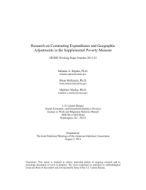
An official website of the United States government
Here’s how you know
Official websites use .gov
A .gov website belongs to an official government organization in the United States.
Secure .gov websites use HTTPS
A lock (
) or https:// means you’ve safely connected to the .gov website. Share sensitive information only on official, secure websites.
-
//
- Census.gov /
- Library /
- Census Working Papers /
- Research on Commuting Expenditures & Geographic Adjustments in the SPM
Research on Commuting Expenditures and Geographic Adjustments in the Supplemental Poverty Measure
Research on Commuting Expenditures and Geographic Adjustments in the Supplemental Poverty Measure
Abstract
For the forthcoming Supplemental Poverty Measure (SPM), the U.S. Census Bureau will use the method proposed by the 1995 National Academy of Sciences (NAS) Panel on Poverty and Family Assistance – subtracting a flat amount from a family’s resources for ‘other’ work-related expenses, with an annual inflation adjustment (see Short 2001). This research examines the appropriateness of applying a flat amount for work-related expenses by investigating geographic variation in average commuting expenses for automobile commuters across 100 urban areas, regions, and divisions, as defined by the U.S. Census Bureau, using two methods: (1) state gas prices and (2) federal reimbursement rate. This research found that these two methods produce significantly different cost estimates. Cost estimates also vary by population size, region, and division. Overall, this research found that there is significant geographic variation in commuting costs and recommends the SPM be adjusted accordingly.
Others in Series
Working Paper
Share
Related Information
WORKING PAPER
Supplemental Poverty Measure Working PapersWORKING PAPER
Commuting Working PapersSome content on this site is available in several different electronic formats. Some of the files may require a plug-in or additional software to view.
 Yes
Yes
 No
NoComments or suggestions?


Top

